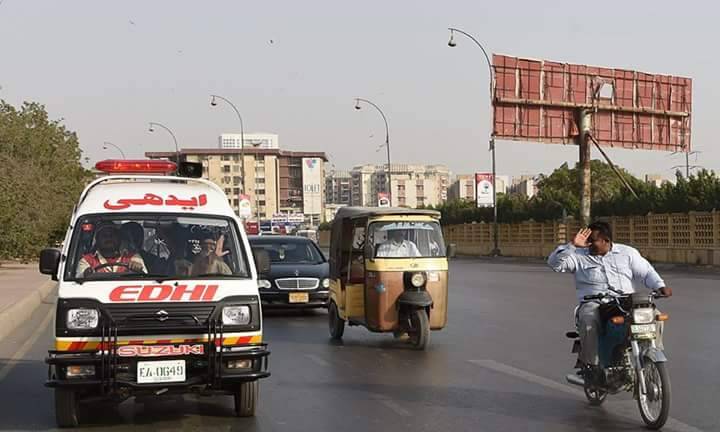Karachi - Revered as hero, Abdul Sattar Edhi set up a system of service in 1951 after coming to Pakistani Karachi from Indian Gujrat.
Content with just two sets of clothes, he set up a safety net for Pakistan's poor and destitute, filling the gap left by a lack of welfare state for the past six decades. In the sticky streets in the heart of Karachi, Edhi, full of idealism and hope, opened his first clinic in 1951. He initially started as a peddler, later became a commission agent selling cloth in the wholesale market. After a few years, he established a free dispensary with the help from his community. He later established Edhi Trust.
Edhi was married in 1965 to Bilquis. He founded the Edhi Foundation, with an initial sum of Rs 5,000. His mother used to give him 1 paisa for his daily eat and another to give to a beggar.
At the age of 19, his mother passed away after an eight year paralysis from a stroke that sparked his struggle to develop a system of services for old, mentally ill and challenged people. Edhi spent his waking hours caring for her, and her worsening health and eventual death left a lasting impact on his life.
The Guardian called him a legendary charity worker known for his asceticism. He has been called the greatest living humanitarian in the world. His Foundation continues to grow in both size and service, and is currently the largest welfare organisation in Pakistan. The annual budget of 1.5 billion rupees ($15 million), mainly from donations by middle- and working-class Pakistanis, continues to grow The Edhi Foundation has rescued over 20,000 abandoned infants, rehabilitated over 50,000 orphans and has trained over 40,000 nurses. His foundation runs more than 330 welfare centres in rural and urban Pakistan which operate as food kitchens, rehabilitation homes, shelters for abandoned women and children and clinics for the mentally handicapped. The Foundation runs the world's largest ambulance service (1,500 ambulance) and operates free nursing homes, orphanages, clinics, women's shelters, and rehab centres. His foundation has run relief operations in Africa, Middle East, the Caucasus region, eastern Europe and the US where it provided aid following the New Orleans hurricane of 2005.
Honoured by Nishan-e-Imtiaz Award in 1989, Edhi also received the Nishan-e-Imtiaz. He was handed the 1986 Ramon Magsaysay Award for Public Service together with his wife, Bilquis Edhi, He is also the recipient of the Lenin Peace Prize and the Balzan Prize.
The masterminding of Pakistan’s largest welfare empire used to sleep in a windowless room of white tiles adjoining the office of his Edhi Foundation. Sparsely equipped, it has just one bed, a sink and a hotplate.
In 2006, Institute of Business Administration Pakistan conferred an honoris causa degree of Doctor of Social Service Management for his services. In September 2010, Edhi was also awarded an honorary degree of Doctorate by the University of Bedfordshire. Edhi has been nominated several times for the Nobel Peace Prize, and appears on the list last year again.
"Social welfare was my vocation, I had to free it," he says in his autobiography, "A Mirror To The Blind". His work so conquered the esteem of Pakistan's masses that armed groups and bandits were known to spare his ambulances. Abandoned children and the elderly, battered women, the disabled, drug addicts; Edhi's foundation now houses some 5,700 people in 17 shelters across the country. It employs around 3,000 people, many of whom were former residents.
The project Bilquis Edhi is most proud of is the baby cradles adoption service.
In the early days of his work, as Edhi cruised the streets in his ambulance, he was made desperate by the number of infant corpses he came across.






